Hathras, Uttar Pradesh
Posters with alphabets and numerals hang on the walls of the two-room house. Two children, four and two-and-a-half years old respectively, are homeschooled as they are not allowed to step out.
Their older sister, seven, has been sent away to her relatives – so that she can be safe, and study.
Watch video
Two years after the rape and killing of their bua – father’s sister – the life of this rural family in Uttar Pradesh has been transformed unrecognisably, in visible and invisible ways. It is the story that is played out in hundreds of thousands of rural Indian homes each year after each rape – a crime that is almost always followed by social ostracisation, judicial delays, livelihood losses, taunts, and deep mental scars that never heal.
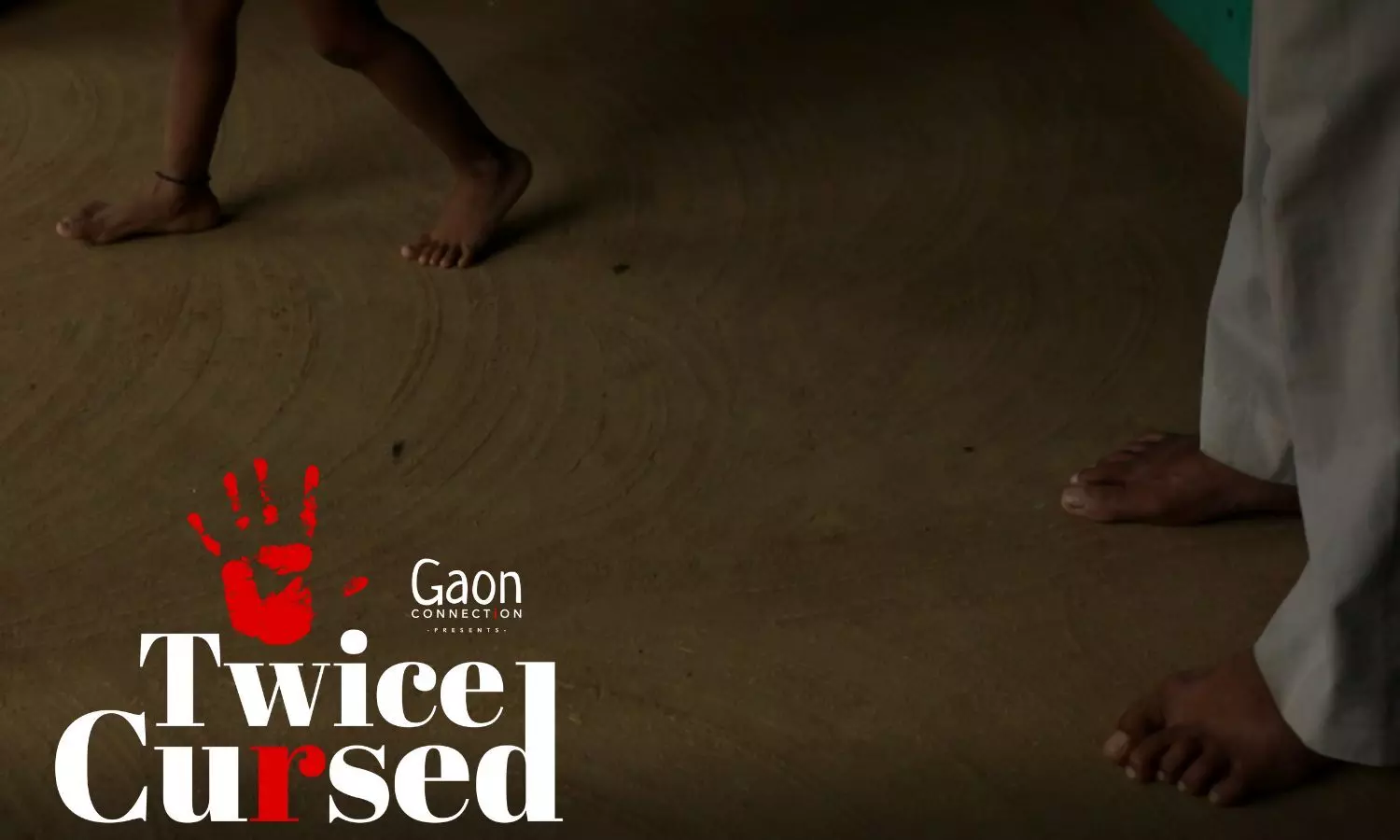
Two children, four and two-and-a-half years old respectively, are homeschooled as they are not allowed to step out.
Hathras – the city and district known for its manufacturing and handicrafts became a notorious dateline two years ago after a 19-year-old Dalit girl was, on September 14, 2020, dragged into a bajra field allegedly by four ‘upper’ caste men, raped, her tongue cut off, and left to die, just 400 metres away from her home.
That home is now teeming with paramilitary soldiers, deployed on the orders of India’s Supreme Court. As a Gaon Connection reporter walks towards the home, it is 10 am and heavy rains lash Hathras. In the distance are black tarpaulin tents in which armed soldiers of the paramilitary Central Reserve Police Force (CRPF) protect the family 24X7. Some of them patrol an area outside the two-room house, holding AK-47 rifles.
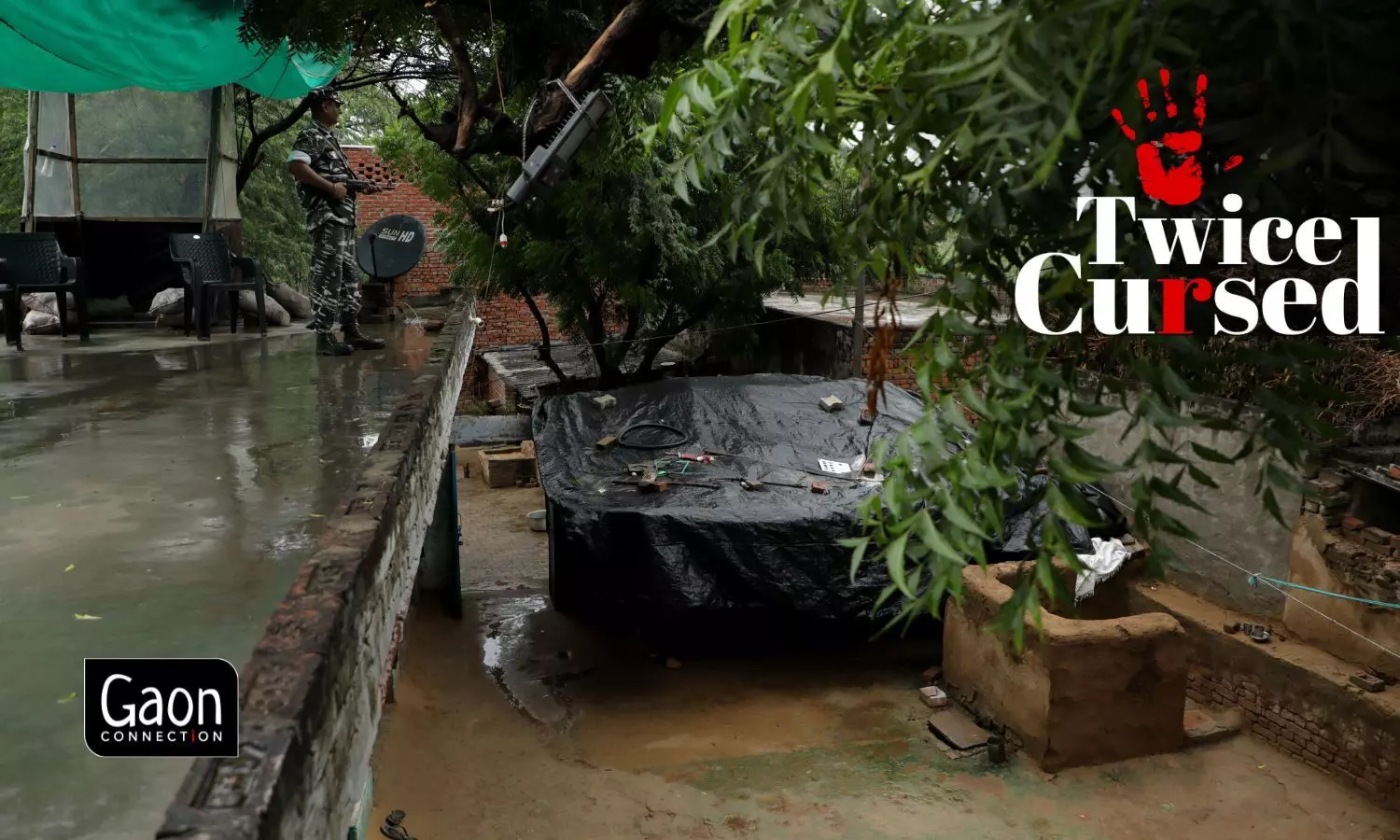
The victim’s home is now teeming with paramilitary soldiers.
The family’s days and nights are spent under the constant vigil of at least eight CCTV cameras. There is a metal detector at the entrance of the house to screen visitors.
“The accused are in jail. And our situation is not much different. It is like being under house arrest,” the victim’s elder brother told Gaon Connection.
“We cannot go anywhere. The CRPF accompanies us even if we have to go to market to buy vegetables, go to the field, or collect fodder for cattle… We only step out when we have to visit the courts or have to buy essential items,” he said. Any family member who has to go to court does so with CRPF escort.
All visitors are stopped a distance away; vehicle numbers, mobile numbers, email IDs, etc. are noted down. And, after the identity of the visitors has been verified, they are finally allowed to enter the house. And, conversations are always conducted in the presence of a CRPF person.
Also Read: Hathras gang rape victim is dead. One rape reported every 15 minutes in India
As part of a new series – Twice Cursed – Gaon Connection goes back to the homes of forgotten rape victims. Their families in rural India fade into obscurity when the media spotlight inevitably shifts to other ‘stories’.
The story of the Hathras rape victim, who was cremated in the dead of the night, allegedly in the absence of her family members, is the first in the Twice Cursed series. It is a reminder of the struggles families of victims of rape face, many of whom belong to the scheduled castes, or the Dalit community.
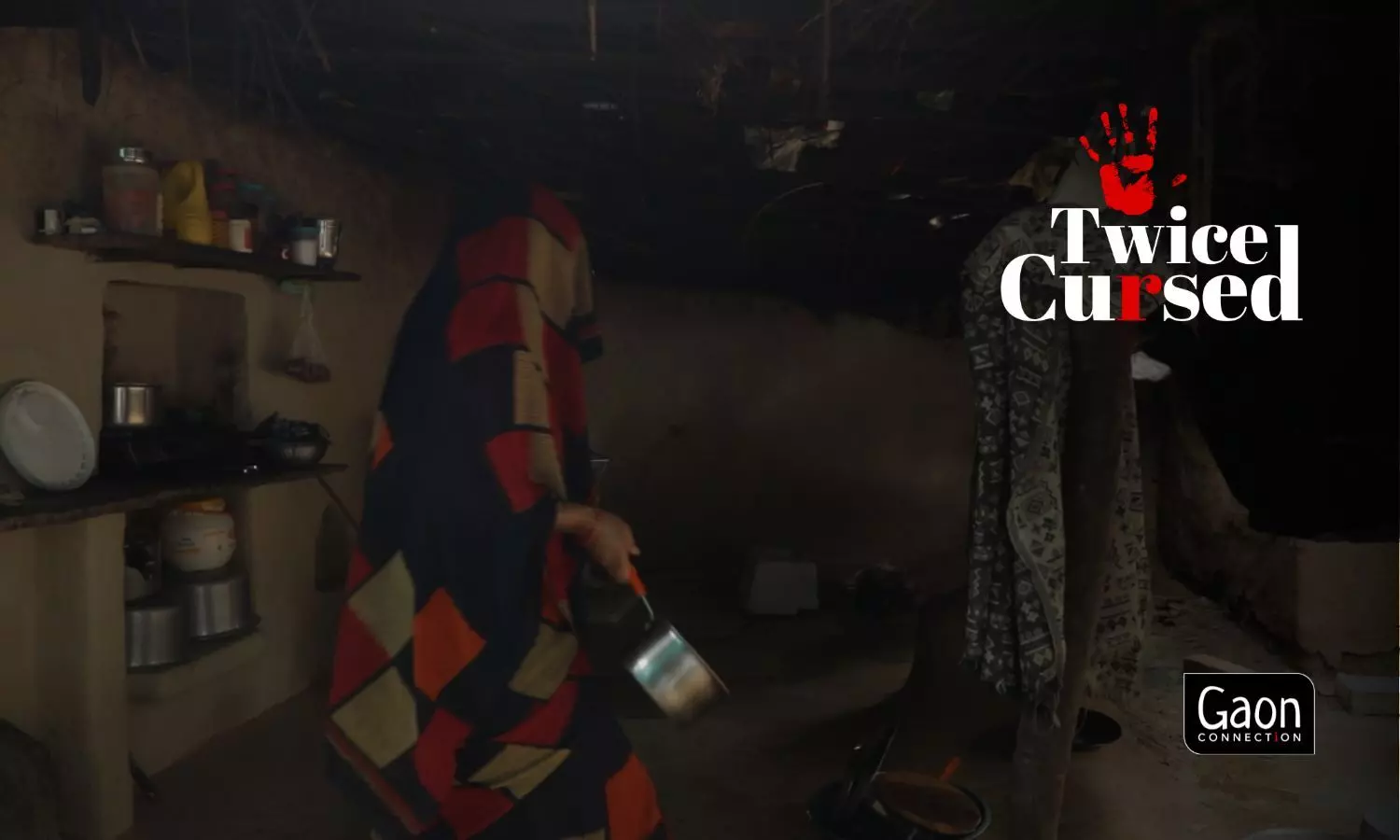
The trial on this gang rape victim has been going on at a special fast track court in Hathras district for over two years now. All the four accused — Sandeep, Ramu, Lavkush, and Ravi — were arrested on September 23, 2020.
But there has been no conviction so far.
“Earlier, we would get weekly dates. Now, we get a hearing date only once in two weeks. There are one hundred and eight witnesses in this case. And it takes at least three to four dates to record statements,” Seema Kushwaha, a Supreme Court lawyer who is representing the Hathras rape victim’s case, told Gaon Connection.
The victim’s older brother too complained of “a delay in court proceedings”. “Before the UP assembly elections, we would get four dates a month for the court hearing at Hathras. But, now we only get two,” he said. “We will continue to fight for justice for my sister. It’s been two years but we have not immersed her ashes in the river. We will not do so till she gets justice,” he added.
Along with the legal battle the family members are fighting, they are also facing ostracism with many in their village not wanting to have anything to do with them. The victim’s older brother said that his wife had also stopped visiting her parents.
The village has a population of about 500 people and the victim’s family is the only Dalit household there. All the other families belong to either Thakur or Brahmin communities, both considered ‘higher’ caste.
There were some villagers who blamed the victim and her family.
“Suraksha to apne hath me haigi,” Malti, a 25-year-old inhabitant of the village, told Gaon Connection.
Another elderly woman in the neighbourhood said, “We remain behind closed doors and feel safe. Our daughters have studied till the eighth. We will soon marry them off. Girls in other villages do BA, MA.”
Meanwhile, the mother of one of the accused, Lavkush, blamed the bahar wali media (journalists from outside the district) for getting her son jailed. She insisted her son was innocent and “the court would serve justice”.
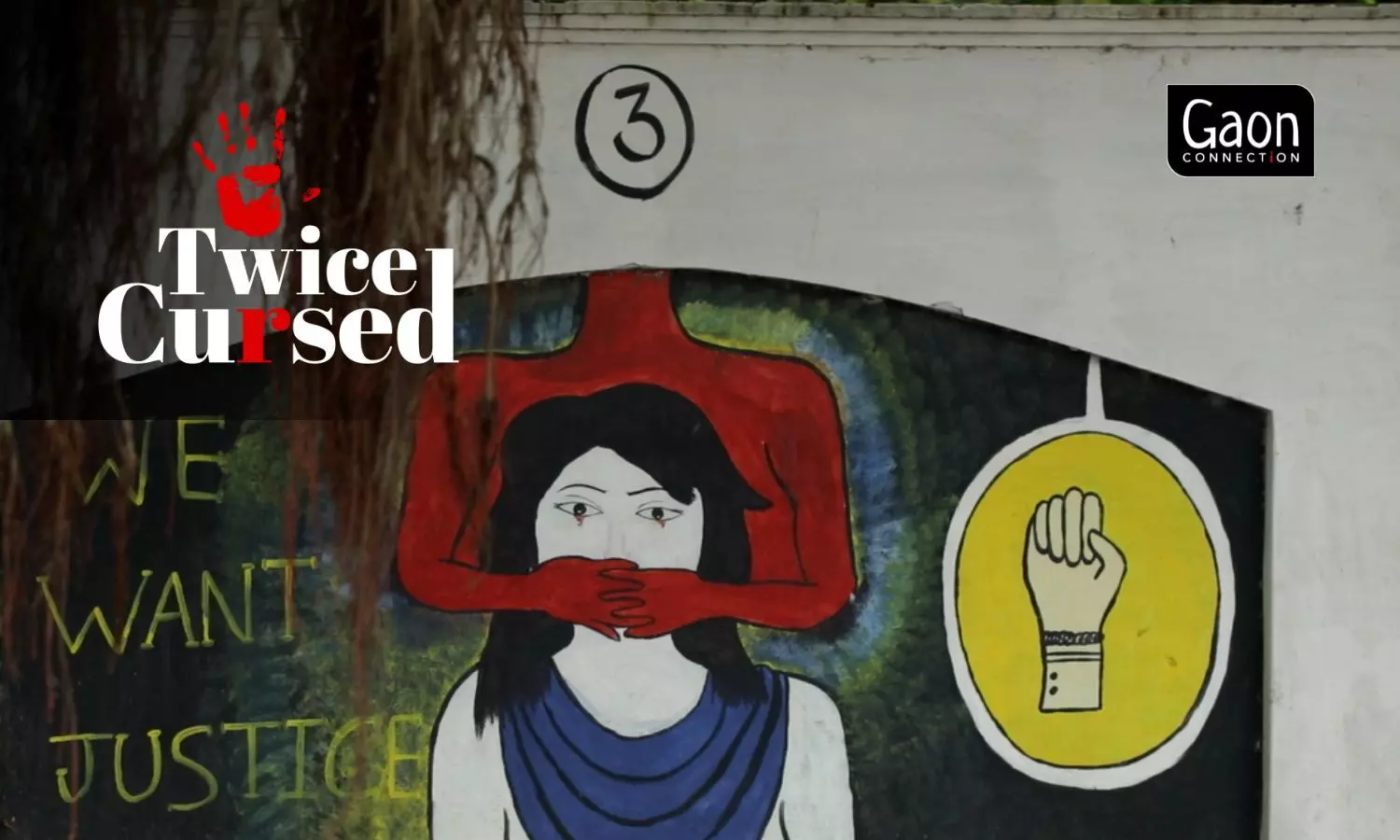
“It’s been two years but we have not immersed her ashes in the river. We will not do so till she gets justice,” said victim’s brother.
The rape victim’s family has received a compensation of Rs 2.5 million (Rs 25 lakh) from the state government. They have also been promised a house of their own, a government job for a family member, and of course, justice for their sister.
“The government has not fulfilled all its promises except for the compensation money. We were offered a house in Hathras, but we want to live outside as we feel threatened by those in the village who support the accused,” said the elder brother.
In July this year, the Supreme Court directed the Uttar Pradesh government to consider employment of one family member within the next three months. This is yet to come about.
To get an update on the government’s promises to the victim’s family, Gaon Connection visited the Hathras district administration office to contact the collector Ramesh Ranjan, but he was unavailable to comment.
None of the family members of the gang rape victim goes out to work. The family includes the victim’s parents, two brothers (elder brother is married), a married sister, grandmother, and three nieces.
Before the rape happened, the two brothers worked in Ghaziabad and Noida respectively, while the father worked at a pathology lab in Hathras. Their combined monthly income was about Rs 20,000.
“Now I’m just at home and doing some farming to feed the family,” said the brother.
There is mistrust too. “We do not even know if the ashes handed over to us two years ago were that of our sister. Because we never got to see her face. The last time I saw her was when her body was being sent for post mortem,” the younger brother told Gaon Connection.
“The administration did not hand over her body to us after the post mortem. When the body was being cremated at night, we were at home. We tried to reach the spot but we were lathicharged and could not get there,” he said.
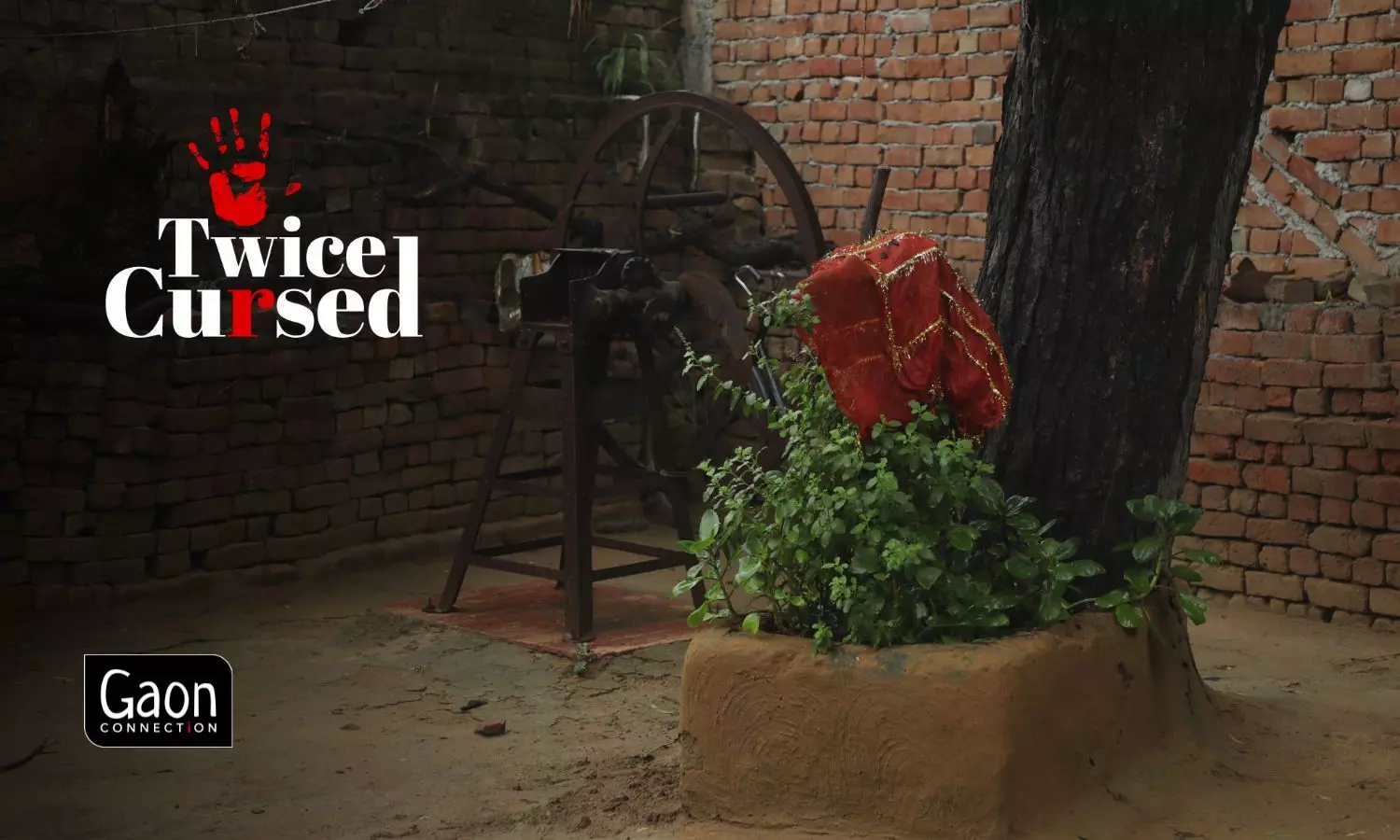
This tulsi was planted by the Hathras gangrape victim and it is all that the family has to remember her by.
“In the Hathras case, the CBI (Central Bureau of Investigation) filed its chargesheet in December 2020. Hearing started only in March and due to COVID (pandemic), hearings were stopped…,” said advocate Kushwaha, who also represented the 2012 Nirbhaya case. “The court has asked the CBI why the conviction has not happened in the Hathras case,” she added.
Also Read: 1/3rd of Nirbhaya fund remains unspent despite increase in rape cases in India
The conviction rate in rape cases for crime against Scheduled Castes is 28.8 per cent. and Scheduled Tribe is 30.8 per cent, shows the National Crime Records Bureau 2021 data.
“Look at the conviction rate in the country… In the Nirbhaya case, it took seven years to get her justice. Initially there were candle marches and outrage, but everything stopped after a certain time,” said Kushwaha.
“The next hearing is on November 2 in Lucknow. It will take at least three or four months to decide on the trial. Then the accused will be punished accordingly,” said the advocate who is based in New Delhi.
Meanwhile, 200 kilometres away from the national capital, back in Hathras, the rape victim’s older brother pointed to a tulsi plant in the courtyard and said, “That tulsi was planted by my sister and it is all that we have to remember her by.”
This is the first story in the ‘Twice Cursed’ series of Gaon Connection.




















